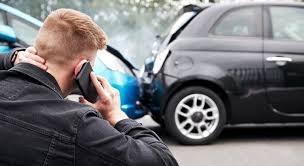Understanding Personal Injury in Uber & Lyft Accidents
In recent years, ridesharing services such as Uber and Lyft have revolutionized the way people commute. Millions rely on these platforms daily for convenient and affordable transportation. However, with the increase in rideshare usage, there has also been a noticeable rise in accidents involving Uber and Lyft drivers. Understanding the complexities of personal injury claims arising from these accidents is critical for victims seeking justice and fair compensation.
Unlike traditional car accidents, Uber and Lyft accidents involve multiple insurance policies and parties. This multi-faceted structure often creates confusion about liability and coverage. Victims must therefore navigate a challenging legal landscape that encompasses drivers' insurance, company insurance, and potentially third-party insurers. In this article, we will explore the intricacies of personal injury claims in Uber and Lyft accidents, the importance of proper documentation, how liability is determined based on the status of the rideshare app, and when to seek professional legal assistance.
The Unique Insurance Structure in Rideshare Accidents
Rideshare accidents differ significantly from traditional car accidents primarily due to the involvement of multiple insurers. When an Uber or Lyft accident occurs, three primary types of insurance policies may be implicated:
- The personal auto insurance of the rideshare driver;
- The commercial rideshare insurance provided by Uber or Lyft;
- Third-party insurance (such as another driver or vehicle involved in the accident).
Understanding how these insurances interact is crucial to asserting your rights and obtaining fair compensation. The involvement of multiple insurers implies that liability might not be straightforward and requires careful consideration of the circumstances surrounding the accident.
How Does Liability Depend on the App’s Status?
An essential factor in determining coverage and liability in Uber and Lyft accidents is whether the rideshare app was active at the time of the accident. The phases of the ride affect which insurance policy applies. These phases generally include:
- Offline or App Inactive: When the driver is not logged into the rideshare app, their personal auto insurance is usually the primary coverage.
- App On, No Passenger: When the driver is logged into the app but has not been assigned a ride or the passenger has not yet entered the vehicle, Uber or Lyft’s contingent insurance policy may apply, which is designed to cover these 'waiting' periods.
- Passenger On Board: When a passenger is actively in the vehicle, commercial rideshare insurance provided by Uber or Lyft generally becomes the primary coverage.
Each phase carries distinct insurance coverage rules, and determining which phase the driver was in at the time of the crash is vital for establishing liability and evaluating the potential claim value.
Documenting Your Ride and Injuries
Proper documentation is an indispensable element in personal injury claims resulting from Uber or Lyft accidents. Victims should collect and preserve as much evidence as possible, including:
- Detailed records of your trip via the app, including pickup and drop-off locations and times;
- Screenshots of ride receipts, driver information, and ride confirmation;
- Photographs of the accident scene, damaged vehicles, and any visible injuries;
- Medical records documenting injuries and treatments;
- Witness statements and contact information if available.
This detailed documentation helps build a strong case by validating the circumstances surrounding the accident and the extent of injuries. It also assists in clarifying whether the app was active, which as explained, influences insurance coverage.
Avoid Accepting Early Settlements Before Clarifying Liability
It is common for insurance companies to offer quick settlements following a rideshare accident. However, victims should exercise caution before accepting any offer. Early settlements may undervalue the claim or fail to take into account long-term medical expenses, pain and suffering, and lost wages. Especially in rideshare accidents, the complexities of insurance policies and liability determination mean that accepting a settlement without fully understanding fault can be detrimental.
Before agreeing to any settlement, victims must thoroughly investigate the circumstances leading to the accident and ensure all liable parties are held accountable. Legal guidance can provide an objective evaluation of the case to ensure fair compensation.
Why You Need Professional Legal Assistance
Given the multifaceted nature of Uber and Lyft accident claims, consulting an experienced personal injury attorney is essential. A knowledgeable lawyer can:
- Understand and navigate complex insurance policies;
- Accurately determine liability based on evidence and app status;
- Negotiate with multiple insurers for maximum compensation;
- Guide you through the claims process to reduce stress and confusion;
- Represent your interests in court if necessary.
Engaging legal counsel early can significantly impact the success of your personal injury claim and ensure your rights are protected at every stage.
Steps to Take After an Uber or Lyft Accident
To safeguard your legal rights and build a strong personal injury claim after an Uber or Lyft accident, follow these critical steps:
- Ensure Safety: Immediately check for injuries and move to a safe location if possible. Call emergency services to report the accident if needed.
- Collect Evidence: Take photos and videos of the accident scene, vehicle damage, and injuries.
- Exchange Information: Obtain driver’s details, including name, contact information, driver’s license, vehicle registration, and insurance details.
- Record Trip Details: Save ride receipts, app notifications, and any correspondence with the rideshare company.
- Seek Medical Attention: Even if injuries seem minor, get evaluated by a medical professional to document your condition.
- Notify Your Attorney: Contact a qualified personal injury lawyer with expertise in rideshare accidents promptly.
Common Types of Injuries in Rideshare Accidents
Rideshare accidents can lead to various injuries ranging in severity. Some common injuries include:
- Whiplash and neck injuries;
- Head trauma and concussions;
- Fractures and broken bones;
- Back and spinal cord injuries;
- Soft tissue injuries;
- Internal injuries and bleeding;
- Emotional and psychological trauma.
Prompt medical evaluation and treatment are essential for your health and also serve as important evidence in personal injury claims.
Rideshare Companies’ Responsibility and Safety Measures
Uber and Lyft maintain insurance policies to provide coverage for accidents involving their drivers. These policies vary depending on the ride phase as previously explained and typically include liability coverage and uninsured motorist coverage. Both companies also implement safety protocols such as driver background checks, vehicle inspections, and real-time GPS tracking to reduce accident risks.
However, despite these measures, rideshare accidents still occur, and the companies’ liability can be triggered when their commercial insurance applies. Victims have the right to file claims against Uber or Lyft when the app is active during the accident or when third parties' negligence is a contributing factor.
The Role of Third Parties in Rideshare Accident Claims
In some rideshare accidents, third parties such as other drivers, pedestrians, or even vehicle manufacturers may bear partial or full responsibility for the crash. Identifying third-party fault opens additional avenues for compensation and legal recourse.
Your attorney will investigate all contributing factors to ensure every liable party is pursued. This comprehensive approach can maximize the compensation you receive for medical bills, lost wages, pain and suffering, and other damages.
Navigating Insurance Claims and Legal Processes
The process of resolving a personal injury claim after an Uber or Lyft accident can be complex and time-consuming. Key stages include:
- Filing the claim with the appropriate insurer(s), whether it be the driver’s personal policy or Uber/Lyft’s commercial policy;
- Gathering and submitting required evidence such as police reports, medical documents, and ride logs;
- Negotiating settlement offers with insurance adjusters;
- Pursuing litigation if a fair settlement cannot be reached.
Obtaining professional legal advice and representation ensures that your claim is handled efficiently and that your rights remain protected throughout this process.
Common Challenges in Rideshare Accident Claims
Victims often face several hurdles when pursuing personal injury claims in rideshare accidents, including:
- Complex insurance coverage and denials based on app status;
- Delays in receiving ride data and driver information from Uber or Lyft;
- Multiple parties disputing liability;
- Pressure to settle quickly from insurance companies;
- Difficulties proving the severity and cause of injuries.
With strong legal support, victims can overcome these challenges to achieve just outcomes.
When to Contact a Specialist Personal Injury Lawyer
If you have been involved in an Uber or Lyft accident and suffered injuries, it is highly advisable to contact a specialized personal injury lawyer as soon as possible. Early intervention helps preserve evidence, protects your rights, and lays the groundwork for a successful claim. A qualified attorney will provide a free case evaluation and guide you through every step, ensuring you are fully informed of your options.
Rideshare accidents present unique legal challenges due to multiple insurance policies and varying liability depending on the status of the ride. Victims must carefully document all trip details and injuries, avoid premature settlement offers, and seek professional legal counsel specializing in rideshare personal injury claims. With expert guidance, victims can navigate the complexities of their claims and secure fair compensation for their losses.
The team at Legal Marketplace Consultant is dedicated to assisting victims of Uber and Lyft accidents by providing comprehensive legal support tailored to each individual’s circumstances. To discuss your case and obtain proper legal assistance, contact us through the communication channels in our bio or send us a private message.
Legal Marketplace Consultant – your trusted partner in complex personal injury and rideshare accident cases, offering expert legal assistance and comprehensive claim management.































